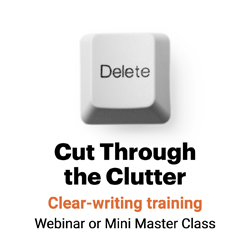They make journalists cry ‘hype’ & more
Why cut adjectives and adverbs from your copy?

Because modifiers:
1. Strike journalists as hype
Writing media relations pieces? Journalists hate hype and fluff … and modifiers are hype-y and fluffy.
“Be fair. Don’t stretch the truth or tell half-truths. When words such as ‘first,’ ‘best,’ ‘biggest’ or ‘only’ are used, there had better be supportive explanations.”
Journalist to researchers in the 17th Annual Bennett & Company Media Survey
No wonder people call this stuff marketing fluff. Or, as one of my clients says, “pouffle dust.”
2. Reveal shoddy research
“Frequently, we use adjectives to paper over a shortage of facts,” writes Mark Duvoisin, reporter and editor for the Allentown (Pa.) Morning Call. He says:
“A ‘troubling number’ — how many is that? And who was troubled by it? Better to let the facts speak. Did half the workers fail to show? Ten percent? One percent? Give the reader the info and let her judge whether it’s troubling or not.”
3. Weaken meaning
Modifiers usually dilute, rather than intensify, your point.
“‘Very angry’ [is] always less than ‘angry,’”
Donald M. Murray, Pulitzer Prize-winning columnist, in Writing to Deadline: The Journalist at Work.
And casino and resort developer Steve Wynn says: “Have you seen any resort built in the last twenty years that isn’t world class? Those words have been drained of all their blood.”
4. Become clichés
Some adjectives and adverbs combine with nouns and verbs to create formulaic language.
“Knee-jerk modifiers … automatically attach themselves to some nouns. Who needs to hear about one more ‘spirited chase’? Or another ‘troubled teenager’? And haven’t we all had enough of ‘angry mobs,’ ‘nasty cuts,’ and ‘trying times’?”
Jack Hart, managing editor of the Oregonian, in A Writer’s Coach.
5. Add bulk without meaning
Besides, modifiers are “the great deceivers,” according to The Associated Press Guide to Good News Writing. Choose strong nouns and verbs instead.

Leave a Reply